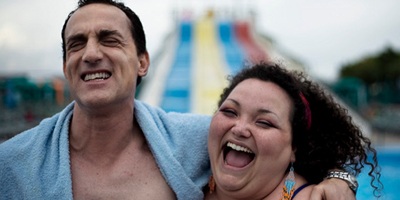 Italian director Matteo Garrone returned to Cannes on Friday, after winning the Grand Prix here just four years ago for the striking mafia indictment Gomorrah, with a film that is yet again set in Naples. Any further resemblances to his previous film, however, are absent, as he finds himself in the totally different realm of satire and comedy, and approaches it with a totally different style. Garrone’s willingness to hop from genre to genre, to challenge himself and broaden his filmic horizon, is commendable. But those expecting him to attack the subject of reality TV and its effect on society with the same tenacity as he brought to the all-pervasive influence of organized crime on Southern Italy in Gomorrah will be severely disappointed. His grip on the film isn’t as assured as in his previous effort, and the end result is a lukewarm satire that lacks the vicious undertone it needs to get the audience really thinking.
Italian director Matteo Garrone returned to Cannes on Friday, after winning the Grand Prix here just four years ago for the striking mafia indictment Gomorrah, with a film that is yet again set in Naples. Any further resemblances to his previous film, however, are absent, as he finds himself in the totally different realm of satire and comedy, and approaches it with a totally different style. Garrone’s willingness to hop from genre to genre, to challenge himself and broaden his filmic horizon, is commendable. But those expecting him to attack the subject of reality TV and its effect on society with the same tenacity as he brought to the all-pervasive influence of organized crime on Southern Italy in Gomorrah will be severely disappointed. His grip on the film isn’t as assured as in his previous effort, and the end result is a lukewarm satire that lacks the vicious undertone it needs to get the audience really thinking.
Luciano (Aniello Arena) is the head of his extended family in one of Naples’ poor working-class districts. He’s also the man the rest of them look up to: blessed with quick wits, owner of a local fish store, always ready to help his friends and family members. He moonlights a bit on the shady side in cahoots with his wife Maria (Loredana Simioli) – segments of the film that also show there is a dark streak in his character. At the start of the film, the family attends a friend’s wedding, the highlight of which is an appearance by Enzo (Raffaele Ferrante), a former Big Brother contestant extending his fifteen minutes of fame and making the most out of it financially. When Luciano gets the chance to try out for the show, he jumps at the opportunity. He sees this as a way out of his family’s poverty, as he believes a career such as Enzo’s will provide riches for the rest of their lives. When Luciano is invited for a second round of tryouts in Rome’s Cinecittà, the anticipation rises. But then Luciano changes. Doubt and paranoia start to creep in, instigated by his family and friends, who suggest the people he is starting to see are probably spies for the TV show checking out his background. Luciano’s life is taking a downward spiral, as he becomes more and more obsessed with the show, and when the reveal of the new season’s contestants draws nearer, he starts to lose sight of reality.
The film touches some interesting subjects, and centering it on not only Luciano, but also his family, is a smart move by Garrone. All his cousins and uncles and grandmothers and whatnot are a spectacle to behold in their own right, a stereotypical loud Italian family. We as the audience laugh at their crassness, their vulgarity, their unrefined nature, yet at the same time most will judge shows like Big Brother as the lowest form of television, something one should really look down on. Garrone is holding up a mirror, as he argues that shows like these are a product of the society they are created in, not the other way around.
The film’s main problem is that Garrone doesn’t seem to know whether he wants to create a biting satire about reality TV and its influence both on and by society, or a broad comedy about paranoia, and the result is something halfway between. There are some Fellini-esque scenes (the opening sequence most striking and disorienting), but the film lacks the satirical wit and bite of the old master. It is clear Garrone is not a fan of shows like Big Brother, but he doesn’t really make an argument as to why. And while Arena is capable enough of delivering broad comedy in the vein of, say, a Roberto Benigni, the script lacks true hilarity. The devolvement of Luciano’s grip on reality offers some interesting psychological insight, but in the final stretch the director loses his own grip on the film, and it goes over the top. The final scene is harrowing and sad, but by then the audience has lost interest in Luciano as a believable character.
On the technical side, the photography by Marco Onorato is most striking, both in framing and lighting (the old Neapolitan building the family lives in is particularly well photographed). The score by Alexandre Desplat, who seems ubiquitous here in Cannes (having scored three of the competition entries already, though it’s fair to say no more will follow), is just whimsical and magical enough to fit the fine line Luciano is treading between fantasy and reality.
